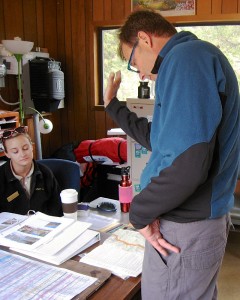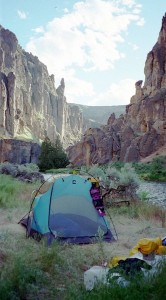In a word, freedom – the freedom to go when and where you please.
RIVER PERMITS
Many kayakers have found that being nimble of time, rig, and personnel has allowed them to pick up last minute released permits, enabling them to insert themselves on good water within prime boating season on America’s overbooked wilderness rivers.
FLEXIBLE CAMPING

Once on the river, late starts and early finishes to break and make camps become unnecessary, and one may experience the river’s diurnal mood much more completely, if not entirely leisurely. Late afternoon and exquisite early evening light on the water may only be experienced with this degree of freedom. The choice of camps becomes much more flexible, depending on the size of the group. A solo boater can pretty much stealth camp anywhere he/she finds enough space to lay down their sleeping bag, savoring evening’s lengthening shadows on the water before the day’s egress.
There may be unintended and practical implications as well. On my first trip down the Middle Fork of the Salmon in the early 90’s, two of my four assigned camps were occupied by rafters by the time I got to them. In the first case, though the transgressing party had clearly not camped at their assigned camp and with darkness falling, I was not even invited to stay, single boat that I was. I floated a mile and a half downstream in failing light as night closed in around me to a welcoming, though small, patch of sand. On the second occasion, I declined the sincere offer to join the interlopers, floating a bit further down beach. As I was pulling the stow floats from my boat, one of the group walked the short trail over to me to make insistently certain that I knew I was not only welcome, but desired, at dinner. I spent the remainder of the evening with the crew, recounting boating stories over supper and cocktails.
ECOLOGICAL PRESSURE

Perhaps a difficult argument to make by fact alone, the economy of gear and rigging required of overnight kayaking seems naturally and likely to impart significantly less pressure to river corridor ecosystems. From a purely solo point of view, single person/boat trips inarguably impart at least an order of magnitude less the amount of ecological pressure to sensitive river corridors than normal sized raft or raft support excursions.
STRESS
Having run a couple of rivers with raft support, it became evident to me that when rafts are involved, particularly as support, an unfortunate, uncivilized, us versus them attitude quickly develops and seems nearly impossible to overcome on the part of rafters towards kayakers. Kayakers are often perceived as not doing their fair share on the river. The facts are, as I observed them, that rafts naturally take much longer to rig, de-rig, and care for than single boats. Offers to assist in rigging can be met with stressed hostility, sometimes completely understandable (sometimes not) – given that the rower desires to pack and balance his raft per their own demands for as uneventful a trip downriver as possible. Meanwhile, single boaters wait patiently in crowded eddies like children consigned to the folding card table at family dinner, or begin their own runs downriver, further distancing themselves from the others. Kayakers, no matter their skill level or experience, are expected to scout rapids for rafts, and then stay clear of the brutes as they lumber downstream. This last expectation has always eluded me in at least one logical sense as, despite being more maneuverable, kayakers ride lower in the water and have more considerably compromised viewpoints than any other river craft, not including tubers. When private party raft support is involved, it can be all to easy for kayakers to become hostage to the demands and whims of rafters.
